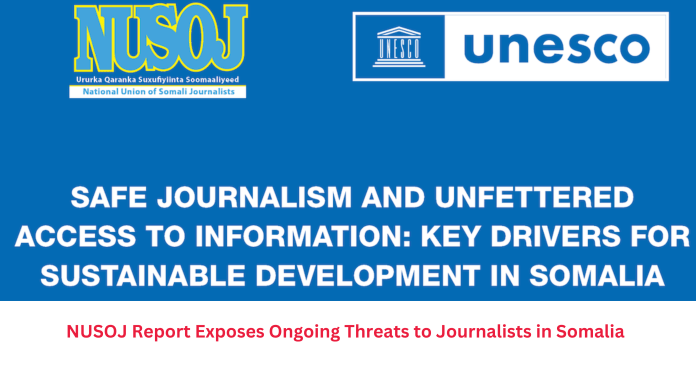Facebook Twitter (X) Instagram Somali Magazine - People's Magazine
Despite No Deaths in 2024, Media Workers Face Arrests, Violence, and Censorship as Somalia Struggles with Press Freedom
To mark World Press Freedom Day, the National Union of Somali Journalists (NUSOJ) released its 14th annual State of the Media report, revealing how difficult and dangerous it still is to be a journalist in Somalia. The report paints a clear picture of ongoing threats, violence, and pressure that Somali journalists face just for doing their jobs.
The report is considered the most detailed and reliable record of media freedom violations in Somalia. It covers a wide range of issues, including physical attacks, arrests, and efforts to control or silence the media.
One positive note is that 2024 was the first year since 2005 in which no journalist was killed. While this is a step in the right direction, the report makes it clear that Somalia is still a very risky place for journalists. Both government forces and non-state actors continue to harass and intimidate media workers.
Over the past year, journalists were blindfolded, beaten, detained without charges, and silenced. Fear and censorship remain major parts of the media environment in Somalia.
The report documented 25 serious cases of media freedom violations in 2024. Most of these involved journalists being arrested or detained illegally—not for real crimes, but as a way to scare or punish them. These actions were not about law enforcement; they were about control.
Somaliland was named the most dangerous region for journalists, followed by SSC-Khaatumo and the Banadir region. In these areas, journalists faced violent home raids, torture, and even forced disappearances.
According to the report, police and security agencies were behind over 80% of the reported violations. This shows that abuse of journalists is not random—it is a widespread and serious problem, especially from state forces.
Another concern raised in the report is the misuse of legal tools to silence journalists. Government proposals such as a new constitutional amendment, the Official Information Bill, and a journalist registration directive are being used to tighten control over the media. These laws are supposed to help the public, but instead, they’re being turned into tools of repression.
The report also points out that many journalists are being economically exploited. A lot of them work without contracts, fair salaries, or basic protections. This kind of mistreatment not only hurts the journalists but also weakens the entire profession and its ability to serve the public.
Female journalists are especially vulnerable. In 2024, there were 21 reported cases of sexual and gender-based violence against women in the media. This shows that women face not only general risks but also gender-specific abuse, highlighting the need for urgent changes to protect them.
NUSOJ emphasized that press freedom is not just about keeping journalists physically safe—it’s about giving them the respect, justice, and working conditions they deserve. The union is calling for real action to end the culture of abuse, ensure fair pay, and stop the organized efforts to control the press.
Omar Faruk Osman, Secretary General of NUSOJ, said that Somalia is now at a turning point. After decades of harsh treatment of journalists, it’s time to protect them and allow them to work in peace. Without a truly free and safe press, there can be no real democracy or progress in Somalia.
NUSOJ dedicated this report to the courage and determination of Somali journalists who continue to report the truth despite facing danger every day.
“Journalists in Somalia should not have to live in fear or suffer violence just for doing their job,” Osman said. “This report is a call to action. Journalism is not a threat—it is essential for building a peaceful and fair Somalia.”

